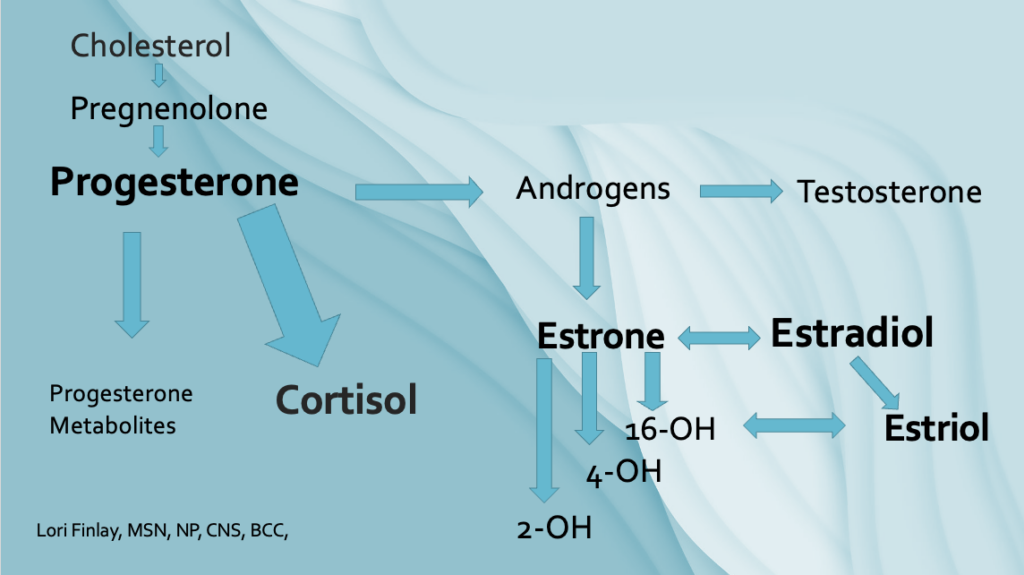– Are These Wreaking Havoc With Your Hormonal Balance?
As women, we face many challenges that can trigger our body’s stress response, causing the release of cortisol. While cortisol is essential for many bodily functions, such as regulating blood sugar levels and reducing inflammation, chronically high levels of cortisol can have detrimental effects on our health. In today’s blog, I will share the effects of cortisol on a woman’s body and discuss some techniques and methods for reducing stress and promoting relaxation, backed by scientific research and personal experience.

The HPA axis
I can imagine that you’ve heard that stress causes a cascade of events that raises cortisol. When stress hits the Hypothalamus (an area of the brain) then it sends a signal to the Pituitary (another area of the brain) which signals the Adrenal glands to produce Cortisol. (note – this is referred to as the HPA Axis, if you see this in the literature or online, now you know that they are referring to)
Without getting too technical with hormonal biochemistry, I want to share a few things to elucidate how stress wreaks havoc with hormonal balance, and the ensuing health challenges, if it continues long term.
Effect on our hormones
Pregnenolone is a master hormone, that converts biochemically to Progesterone – the “life giving” hormone. Per the very simplified hormonal cascade diagram below, you can see that Progesterone converts down to cortisol and over to the androgens (male hormones) and estrogens. If cortisol is ramped up high (see the big fat arrow) then progesterone and pregnenolone are sucked right up. This phenomenon is known as “Progesterone steal”. The stress is “stealing” or sucking dry the reserves of Progesterone. And as you recall from last week’s blog on Estrogen Dominance this is very dangerous, as it dramatically increases your risk of hormone related cancers.

This may not be a major problem if the stress is short term. But, in our modern world, the pattern for most, is chronic daily, unrelenting stress. As women, when we are dealing with deadlines, whether working women or stay at home moms, we are still producing results that need a lot of energy! Deadlines seem to turn on yang energy, which requires a lot more testosterone. Men were genetically designed to have long days, to hunt for 24-36 hours if needed. A women’s body is NOT designed to do that. Women have and need testosterone just like men, but men have at least 16x more testosterone than women to fuel them for long, stressful days. Women on the other hand, must rely on cortisol to produce their results!!
Can you begin to see the dilemma we face in the modern world. When we, as women, are working long hard hours, the cortisol demand is higher, thus the progesterone demand is higher. As you read last week, this can take a huge toll on our hormonal balance, and exacerbating the estrogen dominance risk.
Effect on Metabolism
One of the most well-known effects of cortisol on a woman’s body is its impact on metabolism. Chronically high cortisol levels can lead to weight gain and increased fat storage, particularly around the abdomen. But there are ways to manage cortisol levels and reduce the risk of weight gain. According to a study published in the Journal of Obesity, “Exercise and mindfulness-based stress reduction (MBSR) can decrease cortisol levels and improve metabolic health”. Thus, add exercise and relaxation techniques like yoga or meditation into your routine to help keep cortisol levels in check and promote a healthy metabolism.
Effect on Mental Health
High levels of cortisol can also have a significant impact on a woman’s mental health. Chronic stress, which leads to sustained high cortisol levels, has been linked to anxiety, depression, and other mood disorders. But there are ways to manage stress and reduce cortisol levels to improve mental health. According to the American Psychological Association, “Simple activities like spending time in nature, practicing gratitude, and connecting with loved ones can help lower cortisol levels and improve mood“. So, taking time to engage in activities that bring joy and gratitude can help manage stress and promote mental well-being.
Effect on Reproductive Health
Cortisol can also impact a woman’s reproductive health. High levels of cortisol can lead to irregular menstrual cycles and decreased fertility. But there are ways to manage cortisol levels and promote reproductive health. According to a study published in the Journal of Clinical Endocrinology and Metabolism, “Dietary changes, such as reducing sugar intake and increasing fiber intake, can improve insulin sensitivity and reduce cortisol levels, leading to improved reproductive health”. Incorporating a balanced diet with plenty of fiber-rich foods and reducing sugar intake to manage cortisol levels and improve reproductive health.
Effect on Sleep
Cortisol can also impact a woman’s sleep patterns. High levels of cortisol can lead to insomnia and other sleep disorders, which can further exacerbate the negative effects of cortisol on a woman’s body. But there are ways to manage cortisol levels and promote restful sleep. According to a study published in the Journal of Clinical Sleep Medicine, “Establishing a regular sleep schedule and practicing relaxation techniques before bed can help lower cortisol levels and improve sleep quality“.. So, setting a consistent bedtime routine and practicing relaxation techniques like deep breathing or stretching can help manage cortisol levels and promote restful sleep.
Effect on Aging
Finally, cortisol can impact a woman’s aging process. Chronic stress and high cortisol levels have been linked to accelerated aging and increased risk of age-related diseases, such as dementia and osteoporosis. But there are ways to manage stress and reduce the risk of age-related diseases. According to a study published in the Journal Aging Cell, “Engaging in regular physical activity and social activities can improve stress management and reduce the risk of age-related cognitive decline and diseases.” Perhaps pickle ball, dance lessons, or other social activities that involve movement, can be added to enhance your life.
Simple steps to reduce stress
Decreasing your stress is critical to having a healthy hormone balance, vitality, and longevity. As mentioned earlier, there are certain genes that can increase your response to stress. You may have also had some Adverse Childhood Events as a child or have been diagnosed with PTSD. Each of these may require you to learn additional healthy tools to reduce your stress.
These research results and citations are just the very tip of the iceberg of proof that stress can impact the expression of our DNA – our change of getting dis-ease, or at minimum feeling unwell and off-balance. Doing simple things, like taking a deep breath, can decrease your stress. In fact, abdominal or belly breathing, is the single most important skill for calming your body and mind. According to Brenda Stockdale, MS (renowned psychoneuroimmunologist) “proper breathing is the royal road to calming you down and returning your body to balance”. Breathing can help you shift from running on what I call the “Survival Nervous System”, but you could just as easily call it your “Stressed out Nervous System”.
- Deep breathing
- Meditation
- Yoga
- Take a short walk outside
- Take a short nap or “naptitation” perhaps even playing lovely Theta brain wave music to calm your brain
- Use essential oils – like lavender, peace and calming blend, Serene
- Try Lime and Clove oil blend, apply down your vagus nerve (under your ears)

One of my favorite “habit stacking” tricks is something that I now do every 15 minutes while sitting at my desk. I have a software installed called “IRIS” that will grey out my screen every 15 minutes, for 15 seconds. When the scream goes grey, I stop, close my eyes and take slow deep breaths to relax me, increase PSNS activity and increase my Heart Rate Variability (HRV).
In conclusion, cortisol can have significant effects on a woman’s body, including metabolism, mental health, reproductive health, sleep, and aging. However, there are ways to manage cortisol levels and reduce the risk of negative health outcomes. By incorporating regular exercise, relaxation techniques, a balanced diet, social connections, and establishing a consistent sleep routine, women can promote a healthy cortisol balance and improve overall well-being. It’s important to remember that managing cortisol levels is not a one-time fix but rather a lifestyle change. So, take small steps each day to manage stress and promote relaxation to keep cortisol levels in check to create the vitality you crave!

